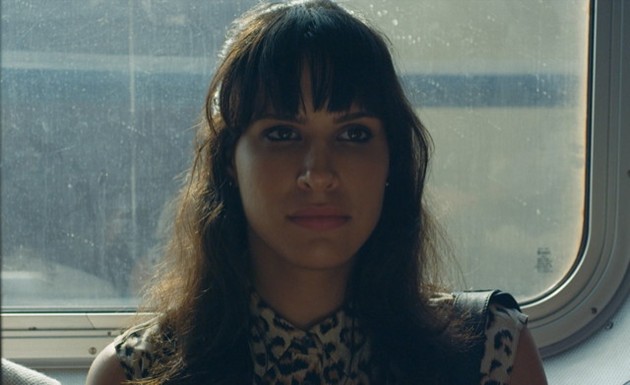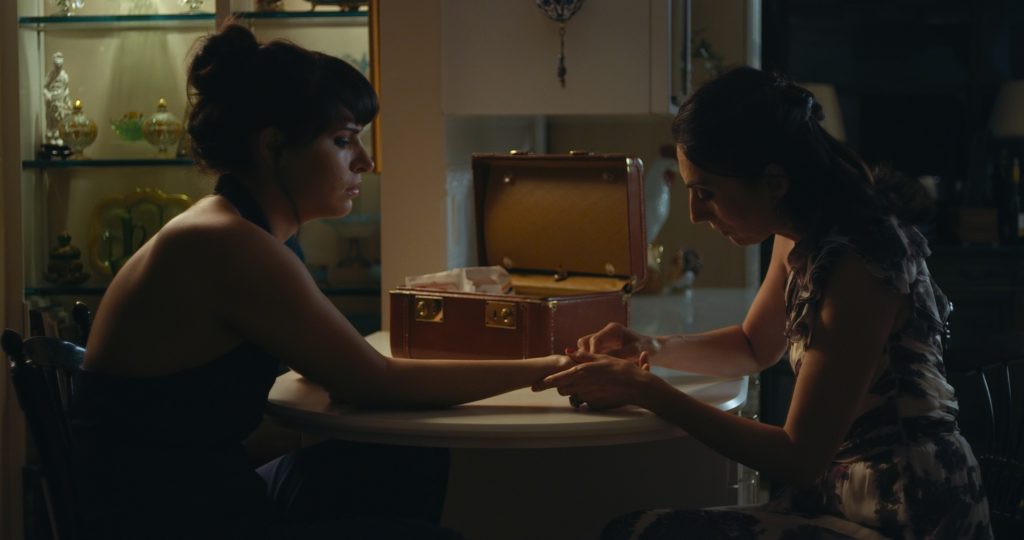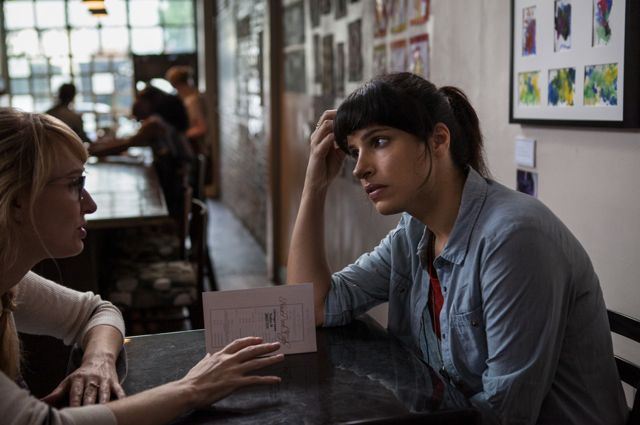The Berlin Film Journal caught up with Iranian queer filmmaker Desiree Akhavan, the supremely talented director of Appropriate Behaviour. Since the film premiered at Sundance in 2014, Akhavan has received a great deal of attention due to her refreshingly honest portrayal of the complexities of modern day queer relationships. During the Xposed Queer Film Festival’s closing night screening of Appropriate Behaviour, we caught up with Akhavan to talk about the film, her stance on Iranian and queer cinema as a movement, and not waiting for anyone’s permission or approval to tell your story.
What was it that first influenced and inspired you to pursue filmmaking?
As a kid I was always performing and putting on plays for my parents. When I was 10 I wrote my first scripts, they were sketch comedies. I have these memories of making photocopies of my scripts and lining them round the house so I could make individual scripts for each person in my class. It was like my own factory line. I did this sketch variety show called ‘Friday Night Live’, and I had this fake advertisement for something called ‘Vomlet’ – the omelet made of vomit. I remember in the show I referenced Showgirls which had just come out at the time, and the teacher said I had to cancel the show because it was too explicit. I loved doing that kind of stuff, I’m always just so full of joy and drive when I’m telling stories.
I always felt that I was extremely mediocre in every other element of my life, so it was never an option for me to do anything else. I did a lot of theatre in school, and I started writing more serious plays that I put on when I was a teenager. I then started studying playwriting and acting, and went to summer schools in the city, always acting in the plays that I wrote. I always thought that I would end up doing theatre cause New York has such a great theatre scene, and it seemed like of course that’s what I would do.
But then when I got to college, the theatre there was just not for me. I auditioned for everything and never got cast, and the plays I wrote no one cared about; I just couldn’t fit in. So I remember I had this real crisis of self where I was like oh, my entire definition of who I am has been based on making theatre, and I’m not fitting in. So I just got stoned all the time. I had one friend who was also a stoner, and she said if you take the bus with me off campus for this history of cinema class then I’ll smoke you up on the bus. So I said ok, let’s go. So I signed up to this class for the free weed, and I just fell in love with film.
Before then it had never made sense to me to make a movie. I didn’t grow up with a camera in my hand, and there was no Youtube. It felt like people who made movies were billionaires in Hollywood, like that was it. Anything else was video art bullshit you saw in a museum. It didn’t seem like people could tell stories on their own terms. When I was like 22 I saw a Joe Swanberg film called Hannah Takes the Stairs and I was like oh ok, some people are doing this on their own terms. That was the first time I’d seen a film that was lower budget. It wasn’t like my parents were cinephiles; they were immigrants who watched shows like Two and a Half Men all the time. It wasn’t like I grew up with this stuff, so when I took that class it exposed me to films I’d never seen before. I’d grown up watching a lot of TV, and a lot of movies that I loved, but very mainstream ones. Film just became my passion and I became very focused on becoming a filmmaker.

A lot of the time women aren’t really given the space in society to tell their stories, but through your film I feel that you are claiming a space of your own. What do you think gave you the drive and the confidence to do this, and why is it important for women to put their stories out there?
I think it’s a sickness, that I’m compulsed to do this. I can’t lie, I’m a very bad liar, and I have too much to say, I talk too much. I don’t think it’s a conscious decision, I think it’s a personality trait. Also, I don’t ever want to feel ashamed, or to feel like I’m keeping secrets. Like when I was 19 I had my first heartbreak. It was with a woman and I was a mess, and I couldn’t tell my parents about it. I felt so lost, and I ended up feeling pressured into getting a nose job, which is like this Persian right of passage, and most Iranian girls I meet have had one. I had always said I would never get one, and had written an article about it in my high school feminist magazine. After having the nose job I remember feeling so ashamed, and I was like if anyone ever finds out I’ll die of shame. And then something clicked in me when I was older, and I was like why? Why should anything I’ve done in my life bring me shame? There was this sadness and weight on my chest, having to hide my sexuality, my personality, and my plastic surgery. I just decided I didn’t want to feel ashamed for anything I did. That’s why I feel like it’s really important to take up space with your work, that when you don’t it implies shame. That’s why it was really exciting to make my web series The Slope, about this gay couple, because at that moment in my life I was really ashamed, I wasn’t really talking to my parents and shit was bad. It’s how I came out to most people in my life. It was really a way of saying like I have no shame, and if you do then get out of my way.
What do you hope to achieve by providing visibility for queer women and women of colour through your filmmaking?
We all hope to achieve so much you know. There’s so much that needs changing. I’m not even going to say what I want to achieve because it’s too tall an order, and it’s going to require more than just one filmmaker. I think it’s going to be a movement. I mean queer cinema is a movement, female directed films are a movement, Iranian cinema is a movement, and humanising marginalised communities is a movement. It’s going to require more people doing it, and also more people not being ashamed to say that they belong to those groups. I feel like there are a lot of filmmakers who don’t like the idea of being a part of a niche film movement, but this just results in less visibility of these movements existing. The more that you are uncomfortable with these labels, the more you ghettoise them. It’s up to us to decide what these labels mean, and to reclaim these terms for ourselves. It’s like people referring to themselves as dyke – I decide what a dyke looks like, I decide how to re-appropriate a term.

You wrote, directed and starred in Appropriate Behaviour, was this because it was important for you to have full control and ownership over the film?
Yes and no. I think it’s important to have ownership, but also this was a story that worked that way. I knew that it would be dumb to hire an actress to do an impression of me when I knew I could do a good job at it, and when I was writing the script I was writing it for myself. I really like to write my own work that I direct, I think that’s ideal, that I have my hand in the script that I direct. I think also because the film is so personal that being at the helm of it I felt really empowered. Specifically when it came to the sex scenes. I’m topless in the sex scenes, I’m simulating oral sex, but I never felt uncomfortable because I knew I was at the helm of the ship. I felt so empowered. I knew I was going to be in the editing room, that I could take any risk I wanted to take, and that I could cut it out if I didn’t think it was appropriate. Being a woman in that position has given me so much confidence, I cannot even tell you. I feel like if you want to just boost your self-esteem then make something. It was really exciting, it really changed my life, being able to say – I did this.
What advice would you give to other young female filmmakers?
I give this advice every time I get asked for advice. It’s just the best thing I can say, is that you shouldn’t wait for someone else to give you the opportunity to do what you want to do, and that you should enable yourself. I’ve watched myself and other people sit around and wait to get the right grant or get this award, and that’s a waste of time. Making my web series was the best thing I ever did. I shot it myself with my friends, the first season was completely free to make, and we just put it online; it was just a joy. Before then I had sent my film off to thirty film festivals and it had been rejected everywhere. No one wanted to program it, and I remember after that happened I was like oh, I’m never going to become a filmmaker because programmers don’t like my work. I had this feeling of needing to be approved by other people, but I don’t think you do in this world we live in. If you make something of quality, and you keep trying, and you don’t give up after one thing is rejected. We made 16 episodes of our web series, and we just kept putting it online, and it grew over the course of years. It was a long process. That’s the thing too, we’re so expectant of over night success, because we read about people’s over night success. I read about my own overnight success and I’m like no, I’ve taken 10 years to try and do this. You have to keep enabling yourself to make work, and focus on the work and not anything else, because the other things fall into place.

I think that it’s so important for women especially, to make things happen on their own terms rather than waiting for approval, which is something that we’ve been taught by society.
Exactly. And I feel that the reason that my film works on any level is that my producer and I said we’re the ones that are going to approve this script. We applied for a lot of grants and we didn’t get any of them. People said that the script wasn’t good enough, and we got a lot of negative feedback, but we just looked at each other and said we like it, we think it’s cool. My producer was able to raise the money through private equity in the UK, and it was a really modest budget. It was just this blind leading the blind, like are you laughing? Am I laughing? – done. And it was the exact same thing with the web series. I was dating the girl I made it with and I was like if I’m making you laugh then we should just make this. Women are constantly not giving themselves permission to make the calls, and to be entitled enough to take up space. I feel like women always feel like they have to wait until someone says to go for it. I remember that I was looking for approval for a long time before I started to shake that off. I was constantly waiting for someone to be like you’re beautiful, before I could believe I was beautiful. But as soon as I felt entitled enough to be beautiful that was when people started telling me that I was. It’s so funny to me.
Do you feel that you can pinpoint a moment where you realised that you had this confidence inside you to go after what you wanted?
It was a bunch of things. I was at film school, and I’d made a short film that did really badly that didn’t go to any festivals, which I’d spent a lot of my money and time working on. At the time I was bulimic, and I was getting worse and worse, so I decided to check myself into an outpatient rehabilitation centre. So I would go during the day, and I would sleep at my own home, and didn’t tell anybody about it. And it changed my life completely. When I came out of that experience I was kind of fearless, and I was better too. I never relapsed after that, it changed my life and was really positive. I fell in love with a woman and told my parents that I was bisexual, all within the space of six months. It was together with that woman that I made ‘The Slope’. I think that if I hadn’t gone to that rehabilitation centre I wouldn’t have had the courage to make ‘The Slope’, because I was so concerned with other people’s approval of me before then, that I was literally making myself sick. Once I reached a point where I was like I’d rather die than be fat, and I realised I wanted to just spend any amount of time or money on making myself not feel that way. So once I made the focus of my life to not feel that way, I started making the best and most honest work I’d ever made, and stopped giving a shit.

You’re currently in the process of developing a new TV series, what is it going to be about, and are you working on any other projects right now?
I have like thirty things I’m developing right now. One of those things is a TV show, which I’m now pitching the pilot for in London, so I might be working with a UK production company to make it. It’s a bisexual dating comedy about a woman who’s been a lesbian her whole life who then starts dating men for the first time in her 30’s. I love it and I really want to make it, but I don’t know if it’s going to happen or when it’s going to happen. I’m also writing a film with my producer, it’s an adaptation of a young adult novel that I see as a throwback to John Hughes’ films. So yeah, I’ve been doing a lot of different projects. I’m excited for the TV show because I love TV. The idea of living with characters for seasons, and to be in one world is so attractive to me. Like I’m also about to start writing a column for the Guardian, which is also really exciting for me because it means that I get to come back and keep this voice going. I love that idea, so if I’m given the opportunity to make this TV show I think it would be great. Because you work with a team of people for years, which just seems so artistically satisfying. To me, and I feel that a lot of filmmakers feel this way; you just look to see where you can tell your stories. And sometimes it’s movies, sometimes it’s a web series, sometimes it’s a book, and it’s whatever that story fits into. Because we live in a world right now which is far less segregated with story telling, and it’s changing a lot. There’s not this same division as there was before, there’s a new fluidity that I really like.




